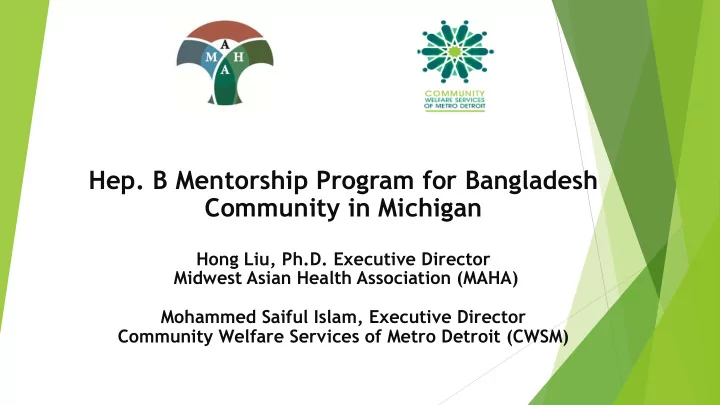

Hep. B Mentorship Program for Bangladesh Community in Michigan Hong Liu, Ph.D. Executive Director Midwest Asian Health Association (MAHA) Mohammed Saiful Islam, Executive Director Community Welfare Services of Metro Detroit (CWSM)
Background: u Target medically-underserved and hard-to-reach Bangladesh community in three cities: Hamtramck (11,000), Warren (7,000) and Detroit (13,600) with a total of 31,600 in these three cities in Michigan u There is no Hep. B program in the Bangladesh Community in Michigan u Very isolated small community without any resources and with low knowledge about Hep. B u Has never been involved in the national efforts for Hep. B awareness and prevention u Purpose: identify and address specific local barriers to HBV awareness, education, and capacity building
Demographics: u Occupations: factory workers, restaurant servers and cashiers at grocery stores u The average annual household income of the population in Warren is $22,000, in Detroit and Hamtramck is $12,000 u Education level is low, most without a high school diploma or equivalent u Unemployment rate of Bangladeshis in these cities is 5.37%
Hep. B Survey: u Conducted a first Hep. B survey in the Bangladesh community in Michigan u Purpose: understand the knowledge level and awareness about Hep. B among the Bangladesh population u 206 people participated in the survey for the first time about Hep. B.
Needs of the Bangladesh Community Outreaching and Preventative educating the Screening for Hepatitis B measures/vaccination Bangladeshi community
Hep. B Program Achievements: • Conducted a first successful community survey project on Hep. B • Formed a first Hep. B Advisory Board consisting of 10 community members • Joined the Hep. B United Coalition representing the Bangladesh community (first time) • MAHA assisted with developing Hep. B presentations and flyer translated into Bangla • MAHA provided on site training on Hep. B screening, immunization and follow-up care • Started a local campaign through distributing Hep. B information and flyers in religious institutions, local grocery stores, and also used social media such as Facebook and Twitter to educate children • Provided community outreach education using various strategies and locations • As a result of the education and awareness, community members have showed an interest in education, screening and vaccination for Hep. B
Formed the first Bangladesh Hep. B Advisory Board consisting of 10 community members:
MAHA Provided On-Site Hep. B Training:
Best Multi-Approach Outreach Strategies: • Social Media : There are 5 group phones consisting 80 members in each group Once we put any message, flyer or information on any group it goes out to 80/85 people of our community • Event: I nvite the people in any local hall where the experts give speech to educate the people on different subjects. • Religious Institute : Masjid where Muslim pray 5 times a day and on Friday many people participate to perform Friday prayer • Group Discussion : Using other existing program in the organization to provide Hep. B group education on Hep B twice a month Muslim Festivals: Muslim people celebrate 2 festivals each year called EID, • one is Eidul Fitr, and other is Eidul Azha. It is on 1st day of 10th month of the Lunar Calendar, and another one on the 10th day of 12th month of the Lunar Calendar. Muslim of all ages get together and pray to God in a large open field or Masjid. Leader give speech after prayer.
Challenges and Barriers to Health Information and Care • Severe shortage of bilingual primary care doctors who are the reliable sources of health information and care for this community • Low health literacy and lack of knowledge regarding patient’s rights and responsibilities • Language and cultural barriers to health care and compliance • Lack of knowledge among the health care providers regarding Hep. B testing and risks • There are few public hospitals in the areas serving the needs of the population • Lack of infrastructure for Hep. B screening, immunization, and follow-up care • Lack of funding resources to provide free Hep. B screening and immunization
Recommendations for Future Efforts: • Continue to provide community education and awareness in a culturally and linguistically competent manner • Build infrastructure for Hep. B screening, immunization and resources for follow-up care • Educate providers about Hep. B screening among the high-risk populations • Empower the patients to talk to their providers and initiate a request for Hep. B testing • Increase efforts to partner and participate in the local and national advocacy activities • Improve fundraising efforts to sustain the program
Recommend
More recommend